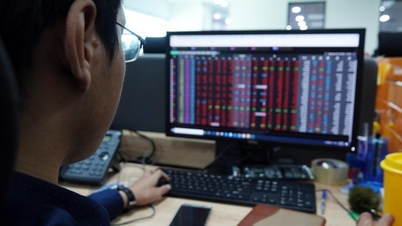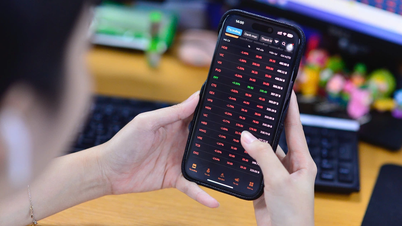At the close of trading on November 10, VN-Index fell more than 18 points to 1,580 points; VN30 fell more strongly by more than 20 points, falling back to the 1,800 point mark. Similarly, the index of the Hanoi Stock Exchange, HNX-Index, also fell nearly 2 points to 258 points.
Notably, the decline appeared again in the 15 minutes of closing orders, causing many investors to panic. Market liquidity dropped sharply, remaining at just over VND21,300 billion.
A notable development was that many stocks suddenly "turned around" and fell sharply at the end of the session. Because, in the early afternoon session, the market had a pretty good recovery, VN-Index at times increased by nearly 10 points, 1,609 points. Many stocks in the securities and real estate sectors increased very strongly by 3-4% but were sold off immediately afterwards.
On many forums and stock investment groups, many people said they are suffering losses in securities, real estate, and banking stocks after buying at the 1,700 point level last month. Up to now, many investment accounts have suffered heavy losses of 20-30%.

Stocks sold off heavily at the end of the session.
Why are stocks often "ambushed" at the end of the session?
Speaking to a reporter from Nguoi Lao Dong Newspaper, Mr. Bui Van Huy, Vice Chairman of the Board of Directors and Director of Investment Research of FIDT Joint Stock Company, analyzed that the stock market in the second and third quarters recorded impressive growth performance, especially focusing on large-cap groups, led by banks, securities and real estate.
This growth has attracted a large number of individual investors to participate. However, this strong growth has created pressure for adjustment.
Information has been fully reflected in prices from market upgrade expectations, the possibility of the FED lowering interest rates, positive third quarter reports... When this information is officially announced, it is no longer enough to push prices higher, but instead triggers profit-taking behavior of smart money.
"The strong and unexpected fluctuations at the end of the trading session exploited the weakness of individual investors with high FOMO (crowd psychology, chasing buyers, chasing sellers). When the market showed signs of profit-taking and prices dropped rapidly at the end of the day, fear was triggered. This made them rush to sell following the crowd psychology to avoid losses, creating a sell-off spiral, making the downtrend much more drastic than intra-session trading, especially at the end of the session" - Mr. Bui Van Huy analyzed.
Financial expert Phan Dung Khanh also said that usually at the end of the trading session - after about 14 hours, the VN-Index begins to reverse and decrease in the context of foreign investors relentlessly selling net and low liquidity, causing psychological pressure on the market.
Therefore, individual investors often follow the crowd psychology, selling heavily or buying heavily, causing the market to reverse quickly. In fact, in recent times, many market sessions have been "ambushed", but there have also been many sessions where the market has increased sharply at the close - opposite to the morning session.
According to experts, the high margin (borrowing rate) of the market and investors, along with thin account buffers when the market is "green on the outside, red on the inside" for a long time, causes the market to have strong sell-offs at the end of the session.
However, in any scenario, investors should not panic and need to maintain confidence in the medium- and long-term market prospects.
Source: https://nld.com.vn/chuyen-gia-neu-ly-do-chung-khoan-giam-manh-cuoi-phien-196251110155826613.htm






![[Photo] Prime Minister Pham Minh Chinh attends the Patriotic Emulation Congress of the Ministry of Foreign Affairs for the 2025-2030 period](https://vphoto.vietnam.vn/thumb/1200x675/vietnam/resource/IMAGE/2025/11/10/1762762603245_dsc-1428-jpg.webp)
![[Photo] Prime Minister Pham Minh Chinh attends the annual Vietnam Business Forum](https://vphoto.vietnam.vn/thumb/1200x675/vietnam/resource/IMAGE/2025/11/10/1762780307172_dsc-1710-jpg.webp)






















































































![Dong Nai OCOP transition: [Article 3] Linking tourism with OCOP product consumption](https://vphoto.vietnam.vn/thumb/402x226/vietnam/resource/IMAGE/2025/11/10/1762739199309_1324-2740-7_n-162543_981.jpeg)











Comment (0)